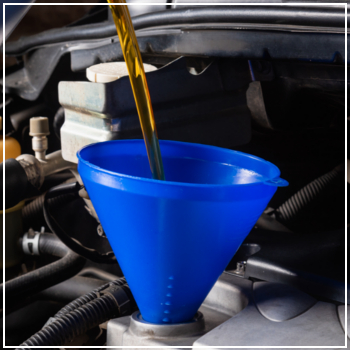Does Your Car Need Synthetic or Conventional Oil?
 Next time you go in for an oil change, you might be asked whether you want conventional or synthetic motor oil. The mechanic may give you some tips based on your car's model and how many miles it has on it.
Next time you go in for an oil change, you might be asked whether you want conventional or synthetic motor oil. The mechanic may give you some tips based on your car's model and how many miles it has on it.
Synthetic oil has become more popular over the years. It used to be only for high-performance cars, but now it's a common choice for regular vehicles because of its low viscosity, which allows it to flow more easily. This can reduce engine stress and even improve fuel efficiency.
It's estimated that about 70% of new cars use synthetic or a synthetic blend instead of conventional oil. However, conventional oil still has its place, especially for older vehicles or in specific situations. Here’s a closer look at both options.
Advantages of Synthetic Oil
Synthetic oil starts with the same base as conventional oil—crude oil—but then additives like castor wax, paraffin, or polyalphaolefin are added to improve performance. There’s fully synthetic oil and synthetic blends, which mix in some conventional oil to make it more affordable. Both types flow better in cold weather, provide longer-lasting lubrication, help clean the engine, and offer better protection for engine parts.
Here are some reasons why synthetic oil is often preferred:
- Synthetic oil is less likely to break down and performs better under high temperatures, which extends its lifespan.
- In winter, synthetic oil flows more smoothly and starts lubricating your engine faster.
- It resists evaporation in hot conditions, making it more stable.
- Great for short trips and city driving, as it warms up quickly, removes moisture, and prevents debris buildup, reducing the risk of sludge and clogs.
- More cost-effective for heavy-duty use, like towing or hauling, thanks to its superior lubrication and durability.
- Can last two to three times longer than conventional oil, meaning fewer oil changes and less waste. Some synthetic oils can go up to 15,000 miles between changes, compared to 3,000 for conventional.
- Less likely to trap water and other particles that can lead to rust and corrosion.
Keep in mind that not all synthetic oil changes are the same. Stick to the recommended 5,000-mile interval or check your owner’s manual for the best option for your car.
When to Choose Conventional Oil
Conventional oil is made from crude oil and includes additives to improve heat resistance and viscosity. It’s usually more affordable, though synthetic can cost up to four times as much depending on the brand. While synthetic is often the go-to, conventional oil still works well in certain situations:
- Older vehicles, since their engines were designed to work with conventional oil. In these cases, conventional may offer better protection and performance.
- Cars with under 75,000 miles. At this point, engines are less prone to wear, and the lower viscosity of conventional oil isn’t as much of a concern.
However, conventional oil tends to degrade faster, especially in colder climates, and takes longer to warm up. This can mean:
- More frequent oil changes, ideally every 3,000 miles.
- Increased risk of engine clogs and deposits.
- More strain on the engine during cold starts, with better performance only once the car is warmed up.
- More likely to hold onto dirt and moisture, leading to increased engine wear if you delay changes.
When it's time for an oil change, make sure to choose the right type for your car. Book an appointment with DaSilva’s Auto Body today and let our team take care of your vehicle. Contact us at our Naugatuck location now!
duplex return filter, high pressure filter,line high pressure filter, inline low pressure filter
Xinxiang Zhike Machinery Equipment Co.Ltd , https://www.zhikefilter.com